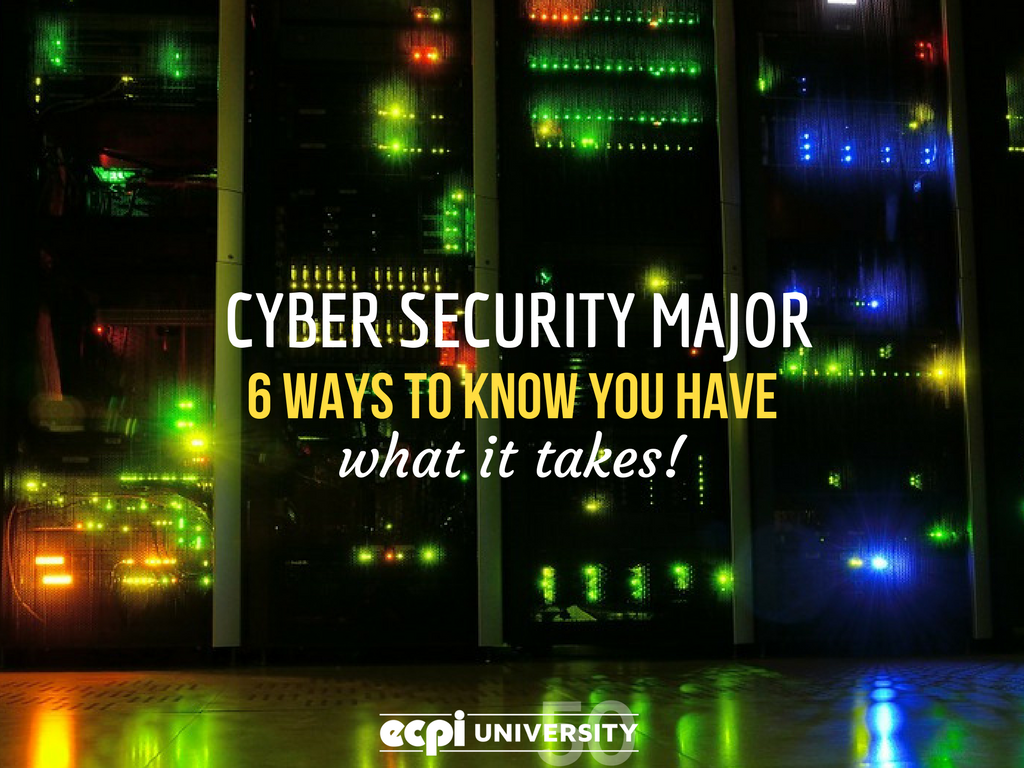Cyber Security Major: 6 Ways to Know You Have What it Takes!
The explosive popularity of the internet made cyber security one of the hottest jobs on the market today. But how do you tell whether you have the right temperament to become a great cyber security major? Here are some of the skills and qualities you need to have to succeed in this field.
1. You're Passionate about Computers
By 'computers', we mean not just the devices themselves, but also the large digital world they connect the user to with the help of the internet. Cyber security is a complex field, and you'll need to know a great deal more than what you will be taught in a classroom in order to excel as a cyber security expert. You need to understand exactly what it is that makes a computer network vulnerable to cyber attacks. You need to know about the various kinds of viruses and malware, how they're made, how to detect their presence, and how to neutralize them.
2. You Like to Dig Deep
Problems that affect computer networks are usually caused by some form of malware or virus, and such types of problems never announce themselves. They try to quietly sneak in through the back. Often the only way to detect their presence is by noticing small signs of a malfunctioning computer, such as a wall of gibberish text in the background or one or more programs not working correctly.
Even after identifying that there is a problem, tracking down its source is also an ordeal. You need to sift through thousands of files either manually or with the help of anti-virus software. You'll have to examine every suspicious file, site, or IP address that may have been responsible for the problem.
3. You're a Problem Solver
After you have identified the problem, you'll need to decide how to deal with it. The problem relates not only to a single computer but often to an entire digital network used by a particular company. In such circumstances, it will be up to you to come up with a solution that removes the virus while keeping the company's data safe. You need to be aware of which software to use to help you do your job, what kind of changes to make to the computer system and how to guard against future problems of a similar nature.
4. You think Outside-the-Box
The world of cyber criminals is constantly coming up with new ways to hack into digital networks. As soon as security teams devise a way to block one kind of virus, it is replaced by a completely new piece of malware that needs to be handled in a different manner. In order to solve the riddle posed by constantly updated malware, you need the ability to think outside the box to come up with effective coping strategies.
A large part of your duty will be to not only remember the lessons you learned in college, but also to be constantly be aware of the latest technologies that can pose a threat to security. A new form of payment, a new website, social media platform, or an online forum, all will need to be vetted and learned about to ensure that their use does not pose a threat.
5. You're Patient
Becoming a cyber security major takes a lot of time and hard work. There are so many branches of digital engineering that you need to study in order to learn how to reverse-engineer malware and understand how it works. You will have to read a great deal, practice on your computer a great deal, and stay on top of the latest technological developments in the field. Doing all this requires patience and perseverance. The simple act of hunting down a particular virus itself can take hours or even days. In all that time your attention must not waver from the problem, nor must you allow yourself to become frustrated and give up the operation halfway through.
6. You're a Team Player
The work of a cyber security expert is not done in isolation. Most companies have an entire team taking care of their cyber security. In order to work well with the team, you need to be able to thrive in group settings. Not only the security team itself, but your work will also place you in the company of other members of the organization whom you need to teach about cyber security or ask details relating to a particular piece of malware you might be investigating. At all these times, it is imperative that you be able to communicate effectively and work with others in harmony to achieve your goal of providing perfect digital security to your company.
Do you think you have what it takes to be a cyber security major? If you’re interested in earning a Bachelor of Science in Computer and Information Science with a Major in Cyber and Network Security - Cybersecurity Track, consider ECPI University. With an accelerated schedule and year-round courses, you could be battling cyber threats faster than you think. For more information, connect with a friendly admissions counselor today.
It could be the Best Decision You Ever Make!
DISCLAIMER – ECPI University makes no claim, warranty, or guarantee as to actual employability or earning potential to current, past or future students or graduates of any educational program we offer. The ECPI University website is published for informational purposes only. Every effort is made to ensure the accuracy of information contained on the ECPI.edu domain; however, no warranty of accuracy is made. No contractual rights, either expressed or implied, are created by its content.
Gainful Employment Information – Cyber and Network Security - Bachelor’s
For more information about ECPI University or any of our programs click here: http://www.ecpi.edu/ or http://ow.ly/Ca1ya.





